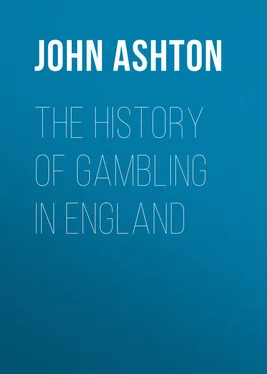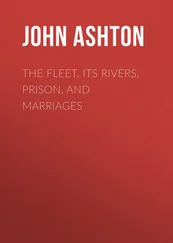John Ashton - The History of Gambling in England
Здесь есть возможность читать онлайн «John Ashton - The History of Gambling in England» — ознакомительный отрывок электронной книги совершенно бесплатно, а после прочтения отрывка купить полную версию. В некоторых случаях можно слушать аудио, скачать через торрент в формате fb2 и присутствует краткое содержание. Жанр: foreign_antique, foreign_prose, на английском языке. Описание произведения, (предисловие) а так же отзывы посетителей доступны на портале библиотеки ЛибКат.
- Название:The History of Gambling in England
- Автор:
- Жанр:
- Год:неизвестен
- ISBN:нет данных
- Рейтинг книги:5 / 5. Голосов: 1
-
Избранное:Добавить в избранное
- Отзывы:
-
Ваша оценка:
- 100
- 1
- 2
- 3
- 4
- 5
The History of Gambling in England: краткое содержание, описание и аннотация
Предлагаем к чтению аннотацию, описание, краткое содержание или предисловие (зависит от того, что написал сам автор книги «The History of Gambling in England»). Если вы не нашли необходимую информацию о книге — напишите в комментариях, мы постараемся отыскать её.
The History of Gambling in England — читать онлайн ознакомительный отрывок
Ниже представлен текст книги, разбитый по страницам. Система сохранения места последней прочитанной страницы, позволяет с удобством читать онлайн бесплатно книгу «The History of Gambling in England», без необходимости каждый раз заново искать на чём Вы остановились. Поставьте закладку, и сможете в любой момент перейти на страницу, на которой закончили чтение.
Интервал:
Закладка:
Professor. For my better instruction, prove that Lots are not to be used in sport.
Preacher. Consider with regard these three things: First, that we reade not in the Scriptures that Lots were used, but only in serious matters, both by the Jewes and Gentiles. Secondly, that a Lot, in the nature thereof doth as necessarily suppose the special providence and determining presence of God, as an oth in the nature thereof doth suppose the testifying presence of God. Yea, so that, as in an oth, so in a lot, prayer is expressed, or to bee understoode (I Sam. xiv. 41). Thirdly, that the proper end of a Lot, as of an oth (Heb. vi. 16) is to end a controversie: and, therefore, for your better instruction, examine these reasons. Whatsoever directly, or of itselfe, or in a speciall manner, tendeth to the advancing of the name of God, is to be used religiously, and not to be used in sport, as we are not to pray or sweare in sport: but the use of Lots, directly of itselfe, and in a speciall manner, tendeth to the advancing of the name of God, in attributing to His speciall Providence in the whole and immediate disposing of the Lot, and expecting the event (Pro. xvi. 33; Acts i. 24, 26). Therefore the use of Lots is not to be in sport. Againe, we are not to tempte the Almightie by a vaine desire of manifestation of his power and speciall providence (Psal. lxxviii. 18, 19; Esa. vii. 12; Matth. iv. 6, 7). But, by using Lots in sport, we tempt the Almighty, vainly desiring the manifestation of his speciall providence in his immediate disposing. Lastly, whatsoever God hath sanctified to a proper end, is not to be perverted to a worse (Matth. xxi. 12, 13). But God hath sanctified Lots to a proper end, namely to end controversies (Num. xxvi. 55; Pro. xviii. 18), therefore man is not to pervert them to a worse, namely to play, and, by playing, to get away another man’s money, which, without controversie, is his owne. For the common saying is, Sine lucro friget lusus , no gaining, cold gaming.
Professor. God hath sanctified Psalmes to the praise of his name, and bread and wine to represent the bodie and bloud of our crucified Saviour, which be holie ends; and the children of God may sing Psalmes to make themselves merie in the Lord, and feede upon bread and wine, not only from necessitie, but to cheere themselves; why, then, may not God’s children recreate themselves by lotterie, notwithstanding God hath sanctified the same to end a controversie?
Preacher. Because we finde not in the Scriptures any dispensation for recreation by lotterie, as we do for godlie mirth by singing (Jam. v. 13), and for religious and sober cheering ourselves by eating and drinking (Deut. viii. 9, 10). And, therefore, (it being withall considered that the ends you speake of, be not proper, though holy) it followeth, that God who only disposeth the Lot touching the event, and is, therefore, a principall actor, is not to bee set on worke by lotterie in any case, but when hee dispenseth with us, or gives us leave so to doe. But dispensation for recreation by lotterie cannot be shewed.
Professor. Lots may be used for profit in a matter of right (Num. xxvi. 55), why not, for pleasure?
Preacher. Then othes may be used for pleasure, for they may for profit, in a matter of truth (Exod. xxii. 8, 11). But, indeede, lots, (as othes) are not to be used for profit or pleasure, but only to end a controversie.
Professor. The wit is exercised by Tables and Cards, therefore they be no lots.
Preacher. Yet Lotterie is used by casting Dice, and by shufling and cutting, before the wit is exercised. But how doth this follow? Because Cards and Tables bee not naked Lots, consisting only in chance (as Dice) they are, therefore, no lots at all. Although (being used without cogging, or packing) they consist principally in chance, from whence they are to receive denomination. In which respect, a Lot is called in Latin, Sors , that is, chance or hazard. And Lyra upon Pro. xvi. saith, To use Lots, is, by a variable event of some sensible thing, to determine some doubtfull or uncertaine matter, as to draw cuts, or to cast Dice. But, whether you will call Cards and Tables, Lots, or no, you play with chance, or use Lotterie. Then, consider whether exercise of wit doth sanctifie playing with lotterie, or playing with lotterie make such exercising of wit a sinne (Hag. ii. 13, 14). For as calling God to witness by vaine swearing, is a sinne, (2 Cor. i. 13) so making God an umpire, by playing with lotterie, must needs be a sinne; yea, such a sin as maketh the offender (in some respects) more blame worthie. For there bee moe occasions of swearing than of lotterie. Secondly, vaine othes most commonly slip out unawares, whereas lots cannot be used but with deliberation. Thirdly, swearing is to satisfie other, whereas this kind of lotterie is altogether to fulfil our own lusts. Therefore, take heede, that you be not guiltie of perverting the ordinance of the Lord, of taking the name of God in vaine, and of tempting the Almightie, by a gamesome putting off things to hazard, and making play of lotterie, except you thinke that God hath no government in vaine actions, or hath dispensed with such lewd games.
Professor. In shooting, there is a chance, by a sudden blast, yet shooting is no lotterie.
Preacher. It is true; for chance commeth by accident, and not of the nature of the game, to be used.
Professor. Lots are secret, and the whole disposing of them is of God (Pro. xvi. 33); but it is otherwise in tables and Cards.
Preacher. Lots are cast into the lap by man, and that openly, lest conveiance should be suspected; but the disposing of the chance is secret, that it may be chance indeed, and wholly of God, who directeth all things (Prov. xvi. 13, 9, 33). So in Tables, man by faire casting Dice truly made, and in Cards, by shuffling and cutting, doth openly dispose the Dice and Cards so, as whereby a variable event may follow; but it is only and immediately of God that the Dice bee so cast, and the Cards so shuffled and cut, as that this or that game followeth, except there be cogging and packing. So that, in faire play, man’s wit is not exercised in disposing the chance, but in making the best of it, being past.
Professor. The end of our play is recreation, and not to make God an umpire; but recreation (no doubt) is lawfull.
Preacher. It may be the souldiers had no such end when they cast lots for Christ his coate (Mat. xxvii. 25), but this should be your end when you use lotterie, as the end of an oth should be, to call God to witnesse. Therefore, as swearing, so lotterie, without due respect, is sinne. Againe, howsoever recreation be your pretended end, yet, remember that wee must not doe evill that good may come of it (Rom. iii. 8). And that therefore we are to recreate ourselves by lawfull recreations. Then see how Cardes and Tables be lawfull.
Professor. If they be not abused by swearing or brawling, playing for too long time, or too much money.
Preacher. Though I am perswaded that it is not lawfull to play for any money, considering that thankes cannot be given in faith for that which is so gotten (Deut. xxiii. 18, Esa. lxi. 8) Gamesters worke not with their hands the thing that is good, to be free from stealing (Ephe. iv. 28), and the loser hath not answerable benefit for his money so lost (Gen. xxix. 15) contrary to that equitie which Aristotle, by the light of nature hath taught long since; yet I grant, if Cards and Tables, so used as you speak, be lesse sinfull, but how they bee lawfull I see not yet.
Professor. Good men, and well learned, use them.
Preacher. We must live by precept, not by examples, except they be undoubtedly good. Therefore, examine whether they bee good and well learned in doing so, or no. For every man may erre (Ro. iii. 4).
Читать дальшеИнтервал:
Закладка:
Похожие книги на «The History of Gambling in England»
Представляем Вашему вниманию похожие книги на «The History of Gambling in England» списком для выбора. Мы отобрали схожую по названию и смыслу литературу в надежде предоставить читателям больше вариантов отыскать новые, интересные, ещё непрочитанные произведения.
Обсуждение, отзывы о книге «The History of Gambling in England» и просто собственные мнения читателей. Оставьте ваши комментарии, напишите, что Вы думаете о произведении, его смысле или главных героях. Укажите что конкретно понравилось, а что нет, и почему Вы так считаете.












